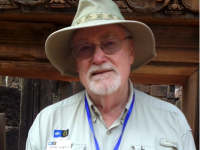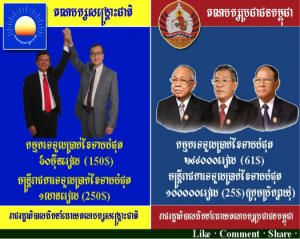Memo #269
By D. Gordon Longmuir – dglongmuir [at] gmail.com
 Cambodia has a liberal democratic constitution that provides for modern institutions and freely elected governments. But to challenge authority has never been a feature of Cambodia’s civic culture. The elections of July 2013 were the fifth since those mounted by the United Nations Transitional Authority in 1993. Losing parties and their allies have contested every single subsequent election outcome. In 1993, Hun Sen’s Cambodian People’s Party (CPP), after a decade of Vietnamese-orchestrated one-party rule, lost to the returned expatriate loyalists of Prince Norodom Sihanouk. Sihanouk averted a coup with a power-sharing arrangement that lasted until his son, Prince Ranariddh, was overthrown in 1997. After that, the CPP, with strong rural support, steadily increased its numbers in spite of long, and sometimes violent, standoffs, initially with Ranariddh’s FUNCINPEC and later with the eponymous party of former Finance Minister Sam Rainsy.
Cambodia has a liberal democratic constitution that provides for modern institutions and freely elected governments. But to challenge authority has never been a feature of Cambodia’s civic culture. The elections of July 2013 were the fifth since those mounted by the United Nations Transitional Authority in 1993. Losing parties and their allies have contested every single subsequent election outcome. In 1993, Hun Sen’s Cambodian People’s Party (CPP), after a decade of Vietnamese-orchestrated one-party rule, lost to the returned expatriate loyalists of Prince Norodom Sihanouk. Sihanouk averted a coup with a power-sharing arrangement that lasted until his son, Prince Ranariddh, was overthrown in 1997. After that, the CPP, with strong rural support, steadily increased its numbers in spite of long, and sometimes violent, standoffs, initially with Ranariddh’s FUNCINPEC and later with the eponymous party of former Finance Minister Sam Rainsy.
The 2013 elections broke abruptly with previous experience. Sam Rainsy, frequently in self-exile to avoid criminal charges, had slowly gained electoral strength in every poll since 1998. In 2013, his SRP merged with Kem Sokha’s Human Rights Party to create the Cambodia National Rescue Party (CNRP); going head to head with the CPP, it won 43 percent of the vote and 55 of 123 seats in the National Assembly. Returning from abroad under a royal amnesty, Rainsy challenged these results, claiming that the CPP-dominated National Election Commission was unable to act impartially.
The CNRP continues to boycott the National Assembly, inaugurated with the 68 CPP members present in September 2013. Hun Sen will neither step down nor call new elections, the key demands of the opposition. These recurring deadlocks have been resolved in the past by power-sharing arrangements, but Rainsy is less amenable to these than was Prince Ranariddh. Young urban voters want the kind of change offered by the CNRP, but its appeal is unfortunately based in part on its popular xenophobic policies vis-à-vis Cambodia’s Vietnamese minority. And a younger, Western-educated elite will soon take control of the CPP: that could signal reforms aimed at reducing the corruption, impunity and human rights abuse that have marred a long period of economic growth, peace and stability.
About the Author:
D. Gordon Longmuir is the former Canadian Ambassador to Cambodia and is an Honorary Research Associate at the Institute of Asian Research at the University of British Columbia.
Links:
“King to Open Assembly on September 23” The Phnom Penh Post, September 2013.
“Election Anger? ‘Let it Go’” The Phnom Penh Post, August 2013
Related Memos:
See our other memos on Cambodia, Southeast Asia.

Comments are closed, but trackbacks and pingbacks are open.